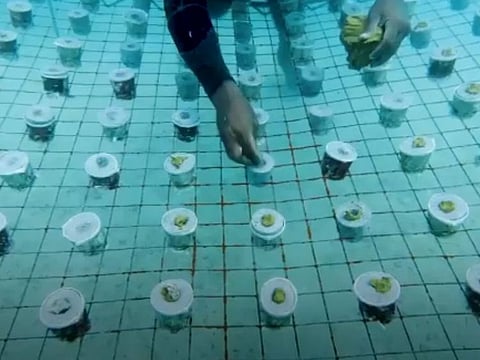Abu Dhabi launches region’s largest coral rehabilitation project
Project aims to culture one million coral reef colonies in the UAE

Also In This Package
Abu Dhabi: Abu Dhabi has launched the region’s largest coral reef rehabilitation project.
The project aims to culture one million coral reef colonies in Abu Dhabi waters in a bid to increase the emirate’s total coral reef area, protect the marine environment and prevent coastal erosion. It has been launched by the Environment Agency Abu Dhabi, the emirate’s environmental sector regulation, under the directives of Sheikh Hamdan Bin Zayed Al Nahyan, Ruler’s Representative in Al Dhafra Region and EAD chairman.
The launch coincides with the World Oceans Day, which is marked annually on June 8.
Importance of coral reefs
Coral reefs are known to provide an important natural habitat for fish and other marine life, and protect from coastal erosion. Global warming and the development of marine areas has however led to the deterioration and bleaching of many reefs around the world.
Shaikh Hamdan therefore stressed the importance of Abu Dhabi’s project in preserving Abu Dhabi’s biological diversity, supporting fisheries, and enabling recreational activities and tourism.
Resilient reefs
“Despite the harsh environmental conditions for coral reefs here in the Arabian Gulf, they are able to adapt and provide habitats for a variety of marine species in the region. They are highly resilient, which enabled them to adapt to the highest temperatures in the world in an unusual way, distinguishing it from other types of coral reefs,” Sheikh Hamdan said. According to EAD experts, Abu Dhabi contains 34 different types of hard corals.
Location of reefs
Mohamed Ahmed Al Bowardi, Minister of State for Defence Affairs and Vice Chairman of the EAD Board of Directors, said the hard corals are spread in several locations, including Ras Ghanada, Butinah, Saadiyat and Alnouf.
“Through this programme, nurseries for coral will be developed to reduce the negative impact of the natural pressures to which coral reefs are subjected due to climate change and high temperatures on the sea floor. As a result, the project will also increase the total coral area and rehabilitate affected areas to preserve the great heritage, economic and scientific value of the coral reefs,” Al Bowardi explained.
Threat to reefs
The increase in water temperatures is the biggest challenge facing coral reefs at present, because it compounds thermal stress and results in coral bleaching. Razan Khalifa Al Mubarak, EAD managing director, said Abu Dhabi lost nmore than 73 per cent of its reefs due to mass coral bleaching in 2017.
“Such loss of coral reefs has been seen across the world, including within the Great Barrier Reef in Australia, which has lost 50 per cent of its living coral area. Through surveys conducted by EAD, an improvement of 10 per cent to 18 per cent in coral reef conditions has been monitored over the past year, which indicates the ability of coral reefs to recover if not exposed to climate change risks,” Al Mubarak said.
EAD initiatives
Since 2005, EAD has implemented a programme to monitor and control the state of coral reefs through seasonal surveys, using data from 10 separate stations located across the emirate of Abu Dhabi. It has also developed a plan for managing and preserving the emirate’s coral reefs in coordination with all partners at the emirate level to understand and research coral reef ecosystems, reduce negative impacts and restore degraded reefs. In addition, EAD is cooperating with academic institutions on coral reef research; for example, with New York University Abu Dhabi on coral reef monitoring, Nawah Company and Zayed University on laboratory propagation and replanting of coral reefs, said Shaikha Salem Al Dhaheri, EAD secretary general.
“Through the implementation of the programme, nurseries for corals will be developed. This will be achieved by harvesting small fragments of the various coral reef species in the emirate’s waters, relocating them to the nursery and nurturing their growth until they can be re-transferred back to the degraded reefs for establishment,” Al Dhaheri explained.
Increase reef area
“The project aims to reduce the negative impact of climate change on coral reefs, as well as increase the coral reef total area in the emirate’s waters, help to rehabilitate areas affected by climate change and human activities, and conduct research and studies to find out the best and most adaptable coral species,” she added.
Phased programme
In the first phase, which will last three years, nursery sites will be selected to ensure a protected environment for growth. This will involve evaluating coral sources and quality standards, based on depth and temperature. A number of underwater nurseries will be set up to nurture and grow coral fragments. The total production capacity is estimated to exceed one million coral colonies.
The programme’s second phase includes harvesting coral nursery stocks, and transporting them to rehabilitation sites. Affected sites will also be cultivated to restore the integrated coral system. The third phase will include the completion of nursery stock harvesting and the restoration of degraded areas with new coral growth.
The EAD is currently developing a plan to manage and preserve coral reefs, and submitting proposals for the expansion and addition of some marine natural reserves with coral reefs.









